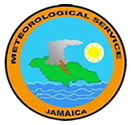Meteorology, the study of the atmosphere especially as it relates to the weather, makes it possible to predict or forecast the weather to a certain extent.
Until the decade of the 40’s in the 20th century, meteorological matters in Jamaica were coordinated by a “Government Meteorologist”, whose chief tasks were the collection and publication of data such as rainfall, temperature, wind direction, wind speed and sea level pressure.
During the 40’s, a formal meteorological service was developed in Jamaica as an adjunct of the British Government’s Air Ministry. This was during the 2nd World War and meteorological activities were expanded to include synoptic weather forecasting, particularly for aviation and marine interests.
The early 50’s saw meteorological activities coming under a centralized Caribbean Meteorological Service, a colonial meteorological organization formed in 1951 and later taken over by the West Indies Federal Government with headquarters in Trinidad.
Following the demise of the West Indies Federation, meteorological activities in Jamaica were taken over by the Government of Jamaica. The Government of Jamaica therefore decides the scope, provides the staff and equipment and meets the cost of the meteorological facilities established internally to serve its own interests.
On gaining Independence in 1962, Jamaica became an individual member of the World Meteorological Organization (WMO), a specialized agency of the United Nations.


